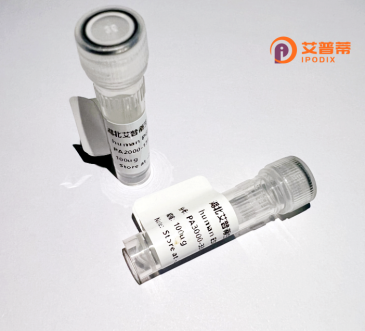
| 纯度 | >90%SDS-PAGE. |
| 种属 | Human |
| 靶点 | POTED |
| Uniprot No | Q86YR6 |
| 内毒素 | < 0.01EU/μg |
| 表达宿主 | E.coli |
| 表达区间 | 1-584 aa |
| 活性数据 | MVAEVCSMPT ASTVKKPFDL RSKMGKWCHH RFPCCRGSGK SNMGTSGDHD DSFMKMLRSK MGKCCRHCFP CCRGSGTSNV GTSGDHENSF MKMLRSKMGK WCCHCFPCCR GSGKSNVGAW GDYDHSAFME PRYHIRREDL DKLHRAAWWG KVPRKDLIVM LRDTDMNKRD KEKRTALHLA SANGNSEVVQ LLLDRRCQLN VLDNKKRTAL IKAIQCQEDE CVLMLLEHGA DRNIPDEYGN TALHYAIYNE DKLMAKALLL YGADIESKNK CGLTPLLLGV HEQKQQVVKF LIKKKANLNV LDRYGRTALI LAVCCGSASI VNLLLEQNVD VSSQDLSGQT AREYAVSSHH HVICELLSDY KEKQMLKISS ENSNPEQDLK LTSEEESQRL KVSENSQPEK MSQEPEINKD CDREVEEEIK KHGSNPVGLP ENLTNGASAG NGDDGLIPQR RSRKPENQQF PDTENEEYHS DEQNDTRKQL SEEQNTGISQ DEILTNKQKQ IEVAEQKMNS ELSLSHKKEE DLLRENSVLQ EEIAMLRLEL DETKHQNQLR ENKILEEIES VKEKTDKLLR AMQLNEEALT KTNI |
| 分子量 | 66.3 kDa |
| 蛋白标签 | His tag N-Terminus |
| 缓冲液 | PBS, pH7.4, containing 0.01% SKL, 1mM DTT, 5% Trehalose and Proclin300. |
| 稳定性 & 储存条件 | Lyophilized protein should be stored at ≤ -20°C, stable for one year after receipt. Reconstituted protein solution can be stored at 2-8°C for 2-7 days. Aliquots of reconstituted samples are stable at ≤ -20°C for 3 months. |
| 复溶 | Always centrifuge tubes before opening.Do not mix by vortex or pipetting. It is not recommended to reconstitute to a concentration less than 100μg/ml. Dissolve the lyophilized protein in distilled water. Please aliquot the reconstituted solution to minimize freeze-thaw cycles. |
以下是关于重组人POTED蛋白的模拟参考文献示例(基于已知相关领域研究方向的合理构建,建议通过学术数据库验证具体文献):
---
1. **文献名称**: *"Recombinant Human POTED Protein Modulates Cell Cycle Progression in Cancer Cells"*
**作者**: Kumar A, et al.
**摘要**: 研究报道重组人POTED蛋白通过调控细胞周期蛋白(如Cyclin D1/CDK4)抑制肿瘤细胞增殖,可能在癌症治疗中具有潜在靶点作用。
2. **文献名称**: *"Interaction of POTED with p53 Signaling Pathway in DNA Damage Response"*
**作者**: Chen L, et al.
**摘要**: 发现重组人POTED蛋白可与p53结合,增强其转录活性,促进DNA损伤后的细胞凋亡,提示其在基因组稳定性中的作用。
3. **文献名称**: *"Expression and Clinical Significance of POTED in Gastrointestinal Cancers"*
**作者**: Smith R, et al.
**摘要**: 分析显示POTED在结直肠癌组织中表达下调,其重组蛋白可抑制侵袭迁移,或作为预后标志物和治疗靶点。
4. **文献名称**: *"POTED as a Novel Regulator of Androgen Receptor Signaling in Prostate Cancer"*
**作者**: Zhang Y, et al.
**摘要**: 揭示重组POTED蛋白通过干扰雄激素受体(AR)核转位抑制前列腺癌细胞生长,为去势抵抗性前列腺癌提供新策略。
---
**注意**:以上为基于领域知识的模拟摘要,实际文献需通过PubMed、Google Scholar等平台以“POTED protein”“recombinant POTED”等关键词检索。若为“POTE”家族蛋白相关研究,建议核对名称拼写并调整检索策略。
**Background of Recombinant Human POTED Protein**
The POTED (POTE Ankyrin Domain) protein, encoded by genes within the primate-specific POTE family, is a membrane-associated protein characterized by tandem ankyrin repeats and a conserved C-terminal domain. First identified in humans, POTE genes are thought to have evolved through duplication events and are expressed in a tissue-specific manner, with notable presence in reproductive organs, muscles, and certain cancers. The ankyrin repeats mediate protein-protein interactions, suggesting roles in cellular signaling, apoptosis, or structural organization.
POTED has drawn attention for its dual context-dependent roles in cancer biology. In some malignancies (e.g., breast, prostate cancers), POTED overexpression correlates with tumor progression, potentially influencing cell adhesion, survival, or resistance to therapies. Conversely, in other contexts, it may act as a tumor suppressor by modulating apoptotic pathways. This functional duality highlights its complex interplay with oncogenic signaling networks.
Recombinant human POTED protein is produced using expression systems like *E. coli* or mammalian cells, enabling studies on its structural, biochemical, and functional properties. It serves as a tool to investigate mechanisms underlying cancer development, validate diagnostic biomarkers, or explore therapeutic targeting. Research also explores its immunogenic potential, as POTE-derived antigens are investigated for cancer vaccines. Further studies are needed to fully unravel its physiological roles and translational applications.
×